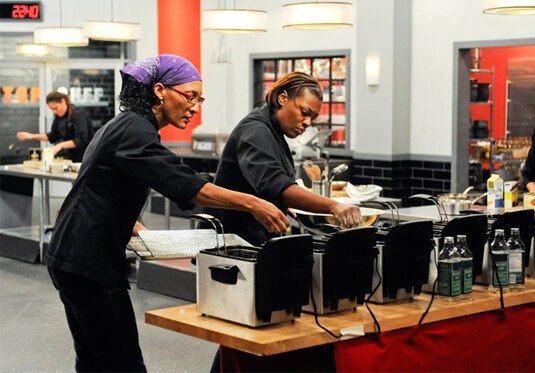Close to Home
Eli Kirshtein defends deep frying and explains why the Gulf challenge is important.

This whole week spoke dearly to me. Being from the south, practically the whole episode hit points close to me. Maybe it was the deep-frying, maybe it was the plight of the Gulf, but it all mattered a lot to me, and to who I am as a chef.
Deep fryers have gotten a bad rap over the years. There is the immediate conception that fryers add fat with no beneficial health qualities in turn. They have also created the stigma that they create low-class, cheap food, which all of these things are beyond distant from the truth. How many households have a fryer at ready availability? How many restaurants don’t have a fryer installed in them? For such a “low-class” thing, they are very rare and elite in our everyday life. I have personally found them ubiquitous at all restaurants I have worked, from super-high volume and humble, to Michelin three-star.
Most dry heat cooking in one manner or another is a form of frying, no matter if it is from sautéing a single side of fish or basting a steak in brown butter, we are applying high heat fat in order to extract moisture. Frying, whether it is from a sauté pan or a deep fat fryer, is fundamental to how chefs cook everyday, and should not be thought down on. Even if they fall out of fashion for health reasons, I strongly recommend you look into deep-frying in your own home.
The importance of Gulf of Mexico seafood, in context to American cookery, cannot be overstated at all. Many of the dishes that have become part of the fabric of honest, “American” cuisine come from the region and cannot be recreated with out the fish from the waters of the Gulf Coast.
We take for granted American shrimp, grouper, and snapper year-round, as well as seasonal oysters and crawfish. With out the Gulf Coast these will all have to come to us from foreign fisheries, frozen or preserved, supporting outside industries and hurting our own domestic economies. Ever since the tragic Deepwater Horizon accident has occurred there has been an unnecessary negative connotation focused on Gulf of Mexico seafood. While there were several commercial fishing areas that were temporarily shut down due to the spill, virtually all of them are back open, and we should aggressively support purchasing any, and all of these aquaculture when we find them available.
There has been a misunderstanding that the BP relief fund has covered all of the losses that have occurred in the area. While they are making a concerted effort to eventually achieve these goals, they still aren’t there yet. There are several funds and organizations that you can contribute your resources to if possible. My personal favorite is The Greater New Orleans Foundation, which you can find at http://www.gnof.org/. If you just want to learn more about the gastronomic diligence of the region I strongly recommend checking out the Southern Foodways Alliance at http://www.southernfoodways.com/. The work that both of these groups do is amazingly important for our collective culinary heritage. So please check these groups out for ways you can help out.
Follow me on Twitter at www.twitter.com/elikirshtein



